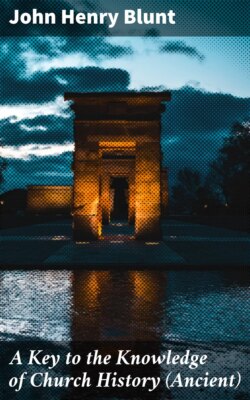Читать книгу A Key to the Knowledge of Church History (Ancient) - John Henry Blunt - Страница 25
На сайте Литреса книга снята с продажи.
Section 1. The First Mission to the Gentiles.
ОглавлениеTable of Contents
A.D. 45.
St. Paul and St. Barnabas sent to preach to the heathen.
It would seem that in the special Eucharistic offerings and Lenten discipline mentioned by St. Luke[1], the Church in Antioch was seeking guidance of her Divine Head as to her duties with respect to the gentile world in the midst of which she was placed; and that the command of the Holy Ghost to consecrate St. Paul and St. Barnabas as Apostles to the heathen was an answer to her cry.
We are not told whose "hands" were "laid" on the two newly-made Apostles in the solemn Consecration Service which followed, but it is likely that St. Peter was at that time at Antioch, and also that the Church in that city was already governed by a Bishop of its own. They complete the Apostolic number. It may here be remarked that the number of the Apostles was now completed. Those whom they ordained to be Bishops or Overseers in the Church of God, as St. Timothy at Ephesus, and St. Titus at Crete, though they received in the "laying on of hands" power to execute such of the highest offices of the Apostolic function as were to be perpetually continued to the Church, yet were not fully Apostles. Difference between Bishops and Apostles. They had grace given to them to confirm, to ordain, and to communicate the power of ordaining to others, but they were not endowed with the extraordinary and supernatural gifts bestowed by the Holy Ghost for the Foundation of the Church; nor did they receive the same direct and outward call as was vouchsafed to the Twelve by our Lord Himself, and to St. Paul and St. Barnabas by the special appointment of the Holy Spirit. They were not to found the Church, but to build up on its Apostolic foundations.
Mission to Cyprus.
The first missionary journey of St. Paul and St. Barnabas was to Cyprus, the native country of the latter. Here the preaching of the Gospel, begun in the Jewish synagogue[2], was continued before the heathen proconsul Sergius Paulus; and through it and the judicial blindness inflicted by St. Paul on the false prophet Elymas, the gentile ruler was won to Christ. St. Paul, the chief Apostle of the Gentiles. St. Paul had now begun to take the lead as the chief Apostle of the Gentiles; it was he who, at Antioch in Pisidia, preached that sermon to the Jews which they would not heed, but which found acceptance with the heathen whom they despised. Missionary journey through Asia Minor. The Jews persecuted and blasphemed, but the Gentiles believed; and, in the account given us of the labours of the Apostles here and at Iconium, we are reminded of the multitude of conversions and of the gladness of heart of the converted in the first days after the great Day of Pentecost[3].
A.D. 46.
At Lystra the Apostles found themselves for the first time in the midst of a thoroughly heathen population, without any admixture of Jews; but here also they did not hesitate to preach the first Christian "Apology against Heathenism," and to display the miraculous powers with which the Holy Ghost had gifted them. The Apostles confirm and ordain. Their Jewish persecutors followed them and drove them to Derbe, the farthest limit of their journey; and from thence they retraced their steps, visiting each place where they had preached the Gospel, "confirming" their numerous converts, and "ordaining" Elders or Presbyters to have the care of those who were thus admitted to the full communion of the Church.
